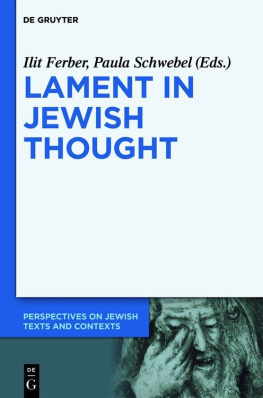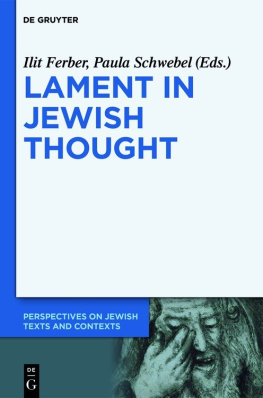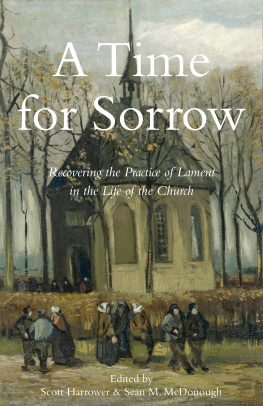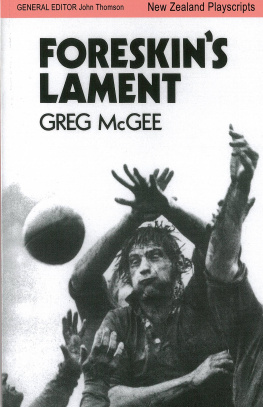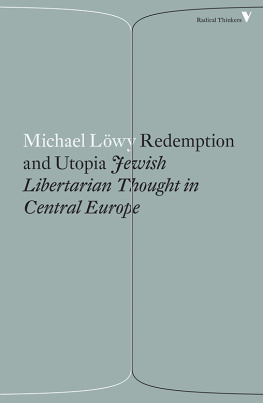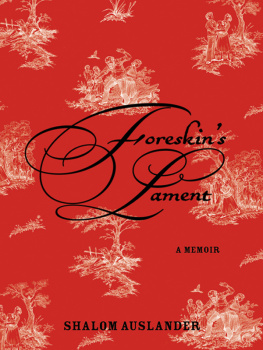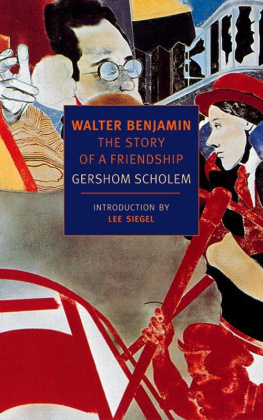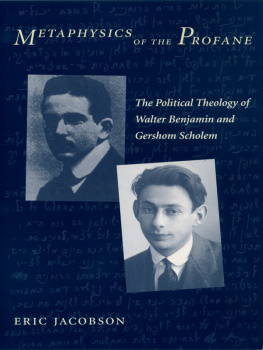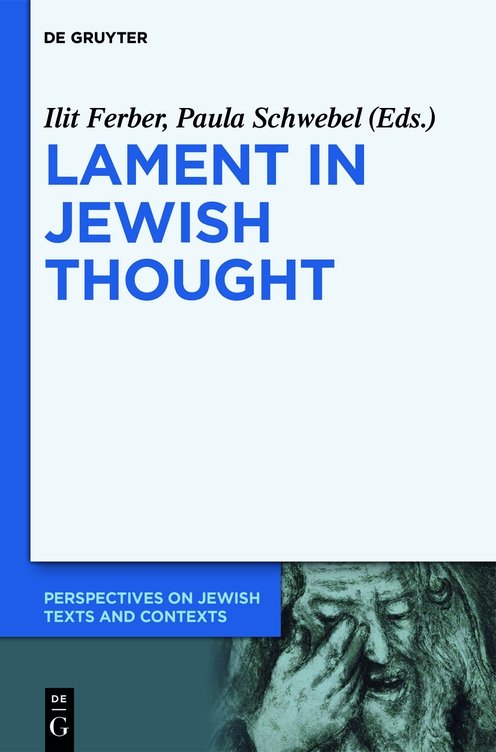This volume results from a fruitful collaboration, not only between us, the editors, but among numerous friends and colleagues without whom the publication of this book would not have been possible. First and foremost, we would like to thank Vivian Liska, who has been the benefactor and supporter of this project from the very beginning. It was Vivian who first introduced us to one another, sparking a longstanding correspondence, which led to the organization of a conference on lament in Jewish thought, hosted by Vivian at the Institute of Jewish Studies at the University of Antwerp in 2012. Vivian also presided over the production of this volume as general editor of the book series Perspectives on Jewish Texts and Contexts. Above all, she is for us an invaluable interlocutor and friend. We thank the Institute of Jewish Studies at the University of Antwerp for providing support for the preparation of this volume. We also thank the participants of the Antwerp conference for a lively discussion, and for their contributions to this volume. We are grateful to Leora Batnitzky, who gave the closing remarks at the Antwerp conference, and who generously contributed the thoughtful Preface to this volume. Lina Barouch is not only the co-translator of Scholems texts on lament, included in this volume, but she is also a dear friend, with whom we have had many valuable conversations on lament. For his exquisite attentiveness to language, his efficiency and good cheer, we thank Jim Gibbons. Last but not least, we are grateful to Ulrike Krauss and Katja Lehming of De Gruyter for their support and guidance throughout the production of this book. We hope that the enthusiasm we feel for the ideas contained in this volume will be transmitted to its readers.
Notes on Contributors
Lina Barouch received her PhD from Oxford University in 2012. Since 2013 she has been a post-doctoral fellow of the Franz Rosenzweig Minerva Research Institute (the Hebrew University of Jerusalem) and the Deutsche Literatur Archiv (Marbach), where she is cataloguing the papers of Heinrich Loewe. Her book Between German and Hebrew: The Counterlanguages of Gershom Scholem, Werner Kraft and Ludwig Strauss is forthcoming in the joint Jewish Studies Series of De Gruyter and Magnes University Press.
Leora Batnitzky is Ronald O. Perelman Professor of Jewish Studies and Professor and Chair of Religion at Princeton University. She is the author of three books: Idolatry and Representation: The Philosophy of Franz Rosenzweig Reconsidered (Princeton University Press, 2000); Leo Strauss and Emmanuel Levinas: Philosophy and the Politics of Revelation (Cambridge University Press, 2006) and How Judaism Became a Religion (Princeton University Press, 2011).
Agata Bielik-Robson received her PhD in philosophy in 1995. She works as a Professor of Jewish Studies at the University of Nottingham and at the Institute of Philosophy and Sociology at the Polish Academy of Sciences in Warsaw. She has published articles in Polish, English, and German on philosophical aspects of psychoanalysis, romantic subjectivity, and the philosophy of religion. Her latest book, Philosophical Marranos: Jewish Cryptotheologies of Late Modernity , will be published by Routledge in September 2014.
Rebecca Comay teaches in the Department of Philosophy and the Center for Comparative Literature at the University of Toronto, where she also directs the Program in Literature and Critical Theory. She has published widely on continental philosophy, psychoanalysis, and contemporary art. Her recent work includes Mourning Sickness: Hegel and the French Revolution (Stanford University Press, 2011), and she is currently working on a project on testamentary issues from Hamlet to Proust.
Ilit Ferber is Assistant Professor of philosophy at Tel Aviv University. Her research focuses on the relationship between philosophy and psychoanalysis and the correspondence between language and the passions. Her monograph Philosophy and Melancholy: Benjamins Early Reflections on Theater and Language (Stanford University Press, 2013) explores the role of melancholy in Benjamins early writings and discusses the relationship of Benjamin, Freud, and Leibniz. She has published on Leibniz, Herder, Freud, Benjamin, Heidegger and Scholem, and co-edited Philosophys Moods: The Affective Grounds of Thinking (Springer, 2001).
Moshe Halbertal is Professor of Jewish Thought and Philosophy at the Hebrew University of Jerusalem and the Gruss Professor of Law at New York University. His latest books are On Sacrifice (2012) and Maimonides: Life and Thought (2013), both published by Princeton University Press.
Werner Hamacher is Emmanuel Levinas Professor of Philosophy at the European Graduate School. Until 2013, he was Professor fr Allgemeine und Vergleichende Literaturwissenschaft at Goethe-Universitt, Frankfurt. His publications include Premises: Essays on Philosophy and Literature from Kant to Celan (Stanford University Press, 1996); Pleroma: Reading in Hegel (Stanford University Press, 1998); and Entferntes Verstehen: Studien zu Philosophie und Literatur von Kant bis Celan (Suhrkamp, 1997).
Galit Hasan-Rokem is Max and Margarethe Grunwald Professor of Folklore and Professor (emerita) of Hebrew Literature at the Hebrew University of Jerusalem. Her books include: Web of Life: Folklore and Midrash in Rabbinic Literature (2000) and Tales of the Neighborhood: Jewish Narrative Dialogues in Late Antiquity (2003). She has served as Head of the Mandel Institute of Jewish Studies at the Hebrew University of Jerusalem and as President of the International Society for Folk Narrative Research.
Adam Lipszyc works at the Institute of Philosophy and Sociology of the Polish Academy of Science and the Franz Kafka University of Muri. He has published four books in Polish, mostly focusing on traces of Jewish theology in twentieth-century thought and literature. His most recent publication is a study of Walter Benjamins philosophy of language and justice ( Justice on the Tip of the Tongue , 2012). He edited and co-translated into Polish two volumes of essays, one by Gershom Scholem and one by Walter Benjamin.
Vered Madar is a researcher of folk culture. In 2011 she received her PhD from the Jewish and Comparative Folklore Program at the Hebrew University of Jerusalem. Currently she is a post-doctoral fellow at the Hebrew University as part of Daat Hamakom: Center for the Study of Cultures of Place in the Modern Jewish World, where she is developing her study about memoirs of Jewish women from Yemen.
Caroline Sauter is a post-doc researcher at the Zentrum fr Literatur- und Kulturforschung (ZfL) in Berlin. Her research focuses on translation and translation theory, the notion of sacred text, and the interrelation between theology, literature and literary theory. Her recent publications include a monograph on Walter Benjamin and translation ( Die virtuelle Interlinearversion , 2014) as well as co-edited volumes on the notion of the sacred in modernity (2013) and on allegories of loving (2014, forthcoming). She received her PhD in Comparative Literature from LMU Munich.
Eli Schonfeld received his PhD in Philosophy from the Hebrew University of Jerusalem. He is a researcher at the Kogod Research Center for Contemporary Jewish Thought at the Shalom Hartman Institute. He lectures at Tel Aviv University and the Hebrew University in Jerusalem. His first book, The Wonder of Subjectivity: A Reading of Levinas Philosophy was published in 2007 by Resling editions. He is currently completing a monograph on consolation in western philosophy and Jewish thought.

